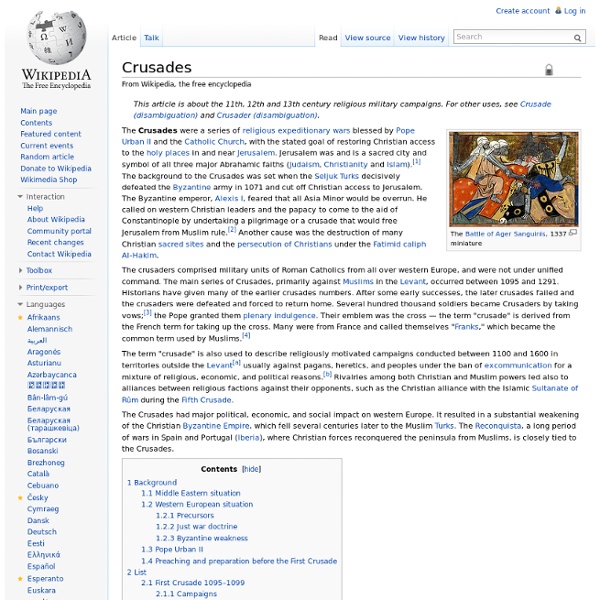Crusades

Crusade
From Academic Kids The Crusades were a series of several military campaigns — usually sanctioned by the Papacy— that took place during the 11th through 13th centuries. Originally, they were Roman Catholic endeavors to re-capture the Holy Land from the Muslims, but some were directed against other Europeans, such as the Fourth Crusade against Constantinople, the Albigensian Crusade against the Cathars of southern France and the Northern Crusades. Beyond the Medieval military events, the word crusade has evolved to have multiple meanings and connotations. For additional meanings see Usage of the term "crusade". Historical background The origins of the crusades lie in Western developments earlier in the Middle Ages, as well as the deteriorating situation of the Byzantine Empire. One later outlet was the Reconquista in Spain, which at times occupied Spanish knights and some mercenaries from elsewhere in Europe in the fight against the Islamic Moors. Historical context The major crusades
Reconquista
The Reconquista ("reconquest")[a][b] is a period of approximately 781 years in the history of the Iberian Peninsula, after the Islamic conquest in 711-718 to the fall of Granada, the last Islamic state on the peninsula, in 1492. It comes before the discovery of the New World, and the period of the Portuguese and Spanish colonial empires which followed. Traditionally, historians mark the beginning of the Reconquista with the Battle of Covadonga (718 or 722), in which a small army, led by the Visigothic nobleman Pelagius, defeated an Umayyad army in the mountains of northern Iberia and established a small Christian principality in Asturias. Concept and duration[edit] The Reconquista, 790-1300 A landmark was set by the Christian Chronica Prophetica (883-884), a document stressing the Christian and Muslim cultural and religious divide in Iberia and the necessity to drive the Muslims out. Background[edit] Islamic conquest of Christian Iberia[edit] Islamic rule[edit] Franks and Al-Andalus[edit]
Mahdia campaign
The Mahdia campaign of 1087 was an attack on the North African town of Mahdia by armed ships from Genoa and Pisa in northern Italy. It had been prompted by the actions of its ruler Tamim ibn Muizz (rule 1062–1108) as a pirate in waters off the Italian peninsula, along with his involvement in Sicily fighting the Norman invasion. The attack was led by Hugh of Pisa, with military aid from Rome; the nobleman Pantaleone from Amalfi was also involved, and the whole endeavour had the backing of Matilda of Tuscany. Crusade historian Carl Erdmann considers the raid a direct precursor to the First Crusade ("ganz als Kreuzzug ausgeführt") which occurred eight years later, as it was conducted under the banner of St. The main source for the campaigns is the Carmen in victoriam Pisanorum, written within months of it by a Pisan religious. Erdmann, Carl.
Related:
Related:



